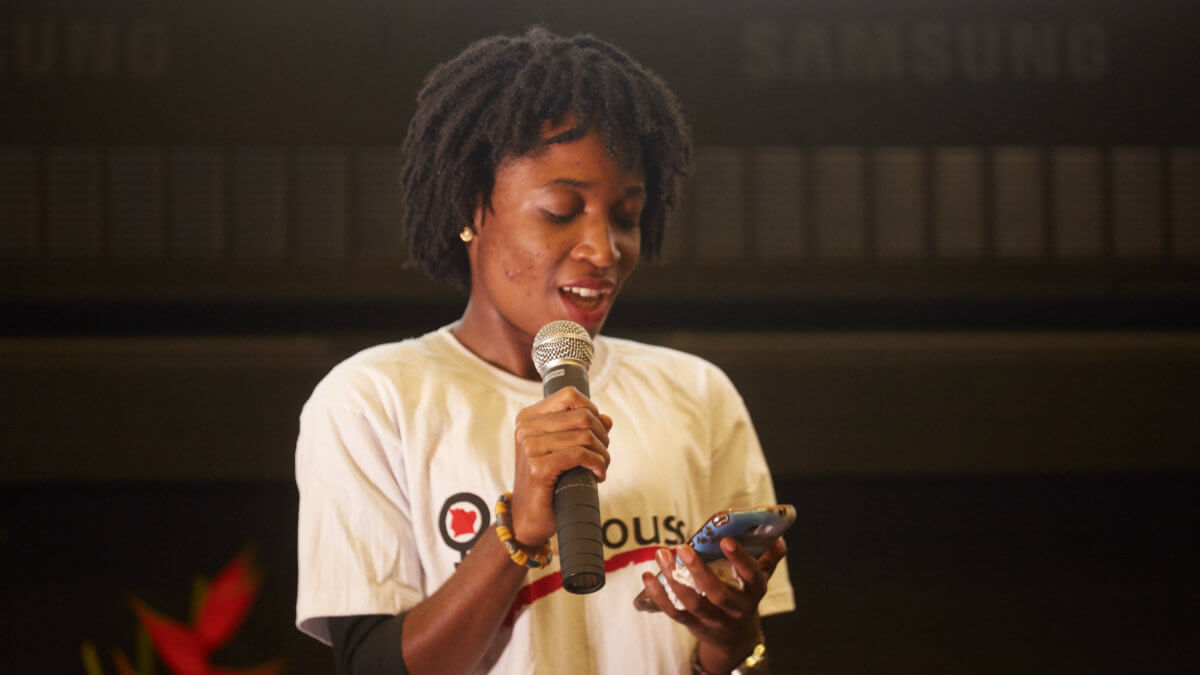
This post was originally published by the Web Foundation. Photo © Charly Kodjo, TechMousso Project Participant. Côte d’Ivoire, 2016.
Ada Lovelace Day, named after the world’s first computer programmer, celebrates the achievements of women in STEM. Despite the formidable legacy that women like Ada have left on ICTs, two full centuries later, women still face significant social, political and economic barriers to using and benefiting from technology, as illustrated by the well-documented digital gender gap. Our Women’s Rights Online programme works with civil society organisations in low- and middle-income countries to address the digital gender gap and ensure that women have equal opportunities to lead the development of ICTs.
Our partners in Nigeria (Paradigm Initiative) and Uganda (WOUGNET) work at a local level to enable women and girls to access technology and overcome online and offline inequalities. What sort of participation challenges do women face, and what methods have the projects used to overcome them?
Paradigm Initiative (Nigeria)
Lagos-based Paradigm Initiative leads digital inclusion programmes that aim to create the right environment for girls and young women to access ICTs and to cement the digital gender gap as a key policy and advocacy issue. Research conducted by the organisation as part of the Women’s Rights Online study found that in urban Lagos, only 36% of women had accessed the web in the last six months, compared to 67% of men. The organisation has identified poverty, accessibility and socio-cultural barriers as factors behind this stark gender divide. Paradigm Initiative’s Chief Operating Officer, Tope Ogundipe, says that these barriers include “socio-cultural biases, such as women’s role in family life or male dominance and supremacy.” She also cites embedded social beliefs on the part of the girls themselves, who enter into programmes believing that computers are “for boys” or “too difficult to understand”.
Their day-to-day activities, which include working with partners in communities to educate girls about the importance of digital skills, and supporting girls to becoming entrepreneurs, are geared towards targeting unemployment and poverty. The project partners with NGOs and other civil society organisations, and conducts focus groups with girls “to better understand the barriers they face in accessing digital skills and other similar opportunities”. Through their work, Paradigm Initiative has improved participation of women in their programmes using ICTs from about 5% in 2012, to 53% by 2015.
WOUGNET (Uganda)
In Uganda, the Women in Uganda Network (WOUGNET) uses “a combination of ICT tools as well as face-to-face community and leadership engagements” to overcome barriers such as illiteracy and affordability, says its founder Dorothy Okello. In collaboration with SPIDER (the Swedish Program for ICT in Developing Regions), WOUGNET “supports an SMS platform to monitor district service delivery and social media for awareness in eastern Uganda”, says Okello. In addition, “regular radio programmes and community meetings together with a network of Voluntary Social Accountability Committee members help to create awareness about the programme both to the community as well as to the local service leadership”.
As Dorothy Okello suggests, the “more we can relate the use of ICTs to addressing local solutions, the better the opportunity for increasing the uptake of a variety of ICTs and for reducing the digital gender gap”. We are hopeful that similar projects championing women’s access to technology enable future women innovators to leave their mark on technology.
Striving for digital gender equality
Ada Lovelace changed the world with her contribution to computing, and yet her remarkable contribution to ICTs was left largely forgotten for almost two centuries. Today is a time to recognise the impact that women have made to the field. However, it’s also a reminder that we still have so far to go to reach gender equality in tech. Going forward, we call on governments to integrate digital inclusion policies and initiatives to ensure that women’s potential contribution to ICTs is a reality. We need to end the digital gender divide. We need more girls to pursue education and careers in STEM. We need more women like Ada.
Ada Lovelace
It’s her day today.
To all the girls in #STEM
Do it.
Do it now.
Do all of it.
Do as much as you can.
Do it as long as you can. pic.twitter.com/xV1FrdlSID— Nnenna (@nnenna) October 10, 2017
Leave a Reply